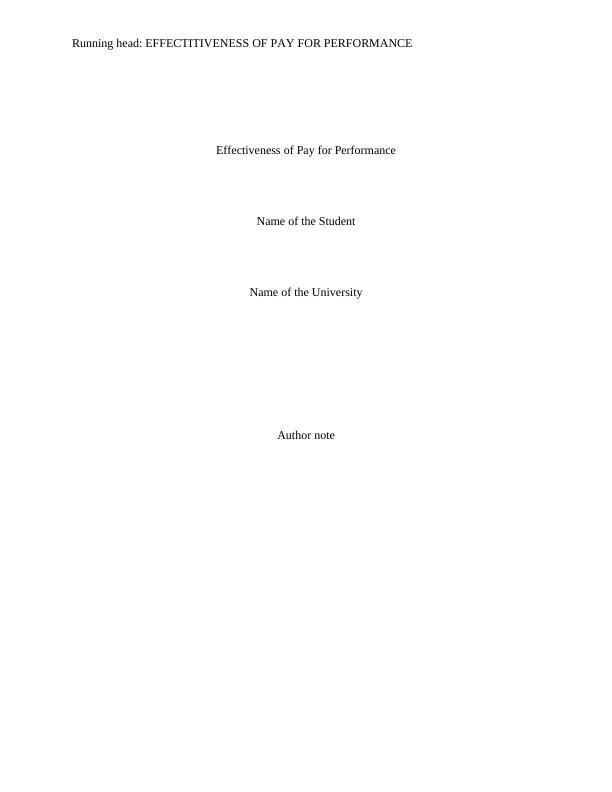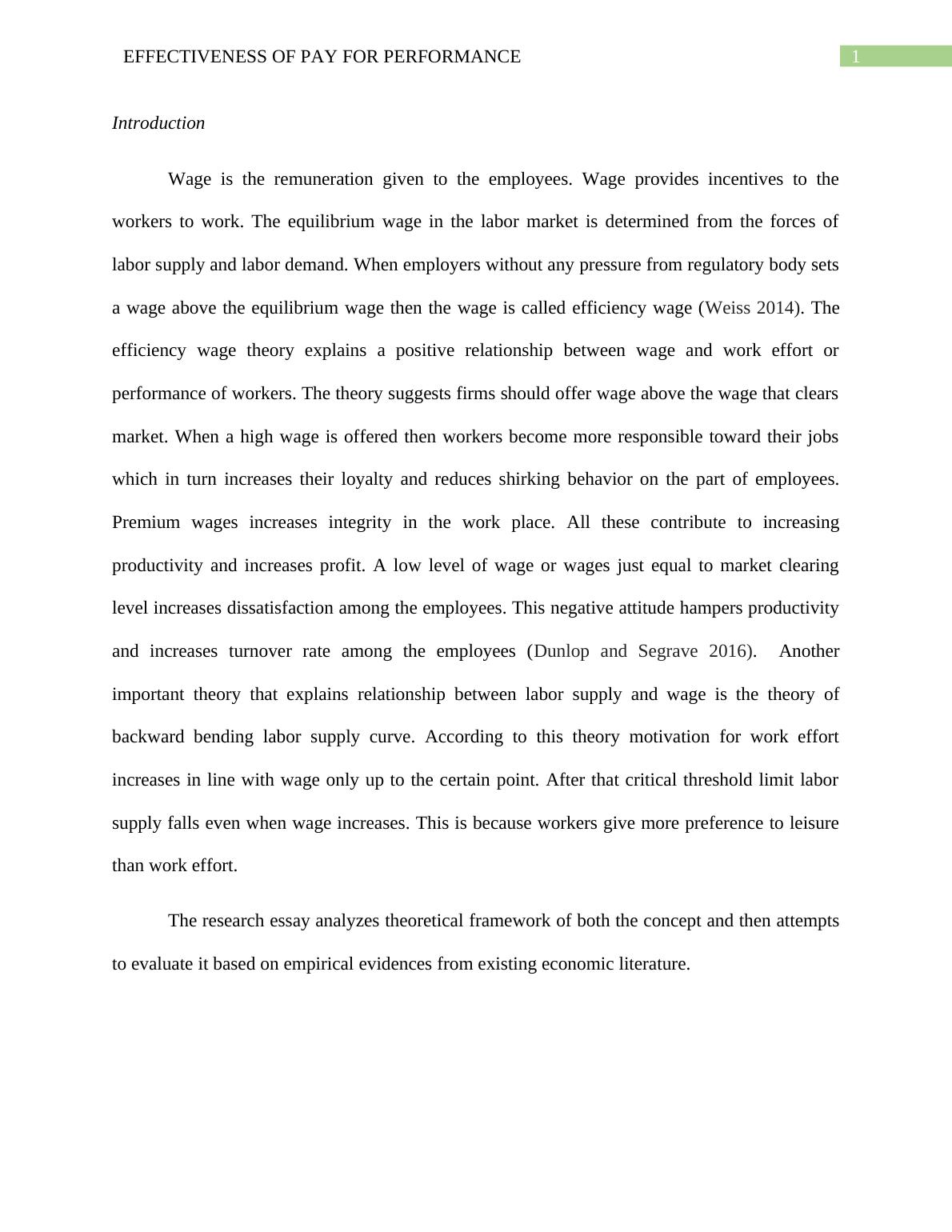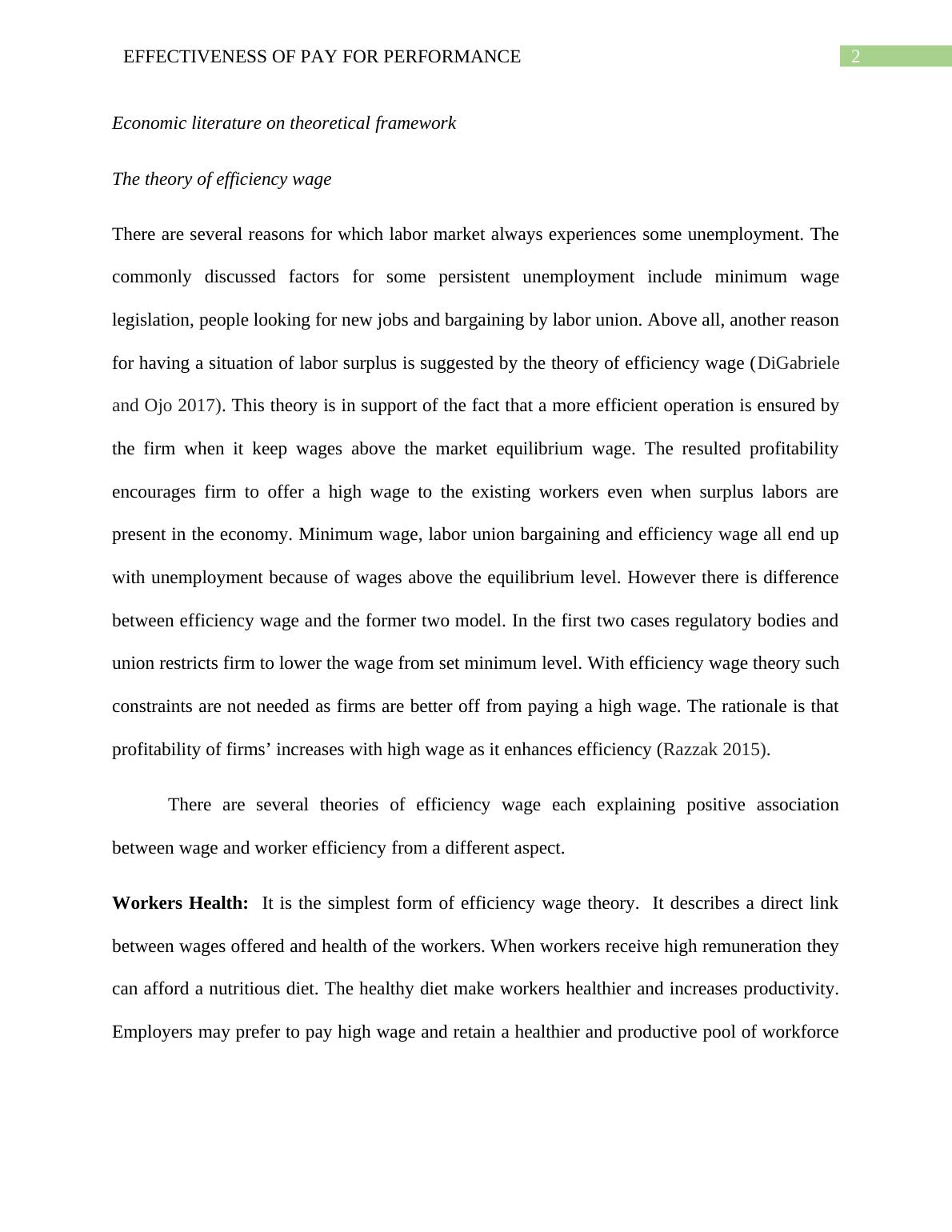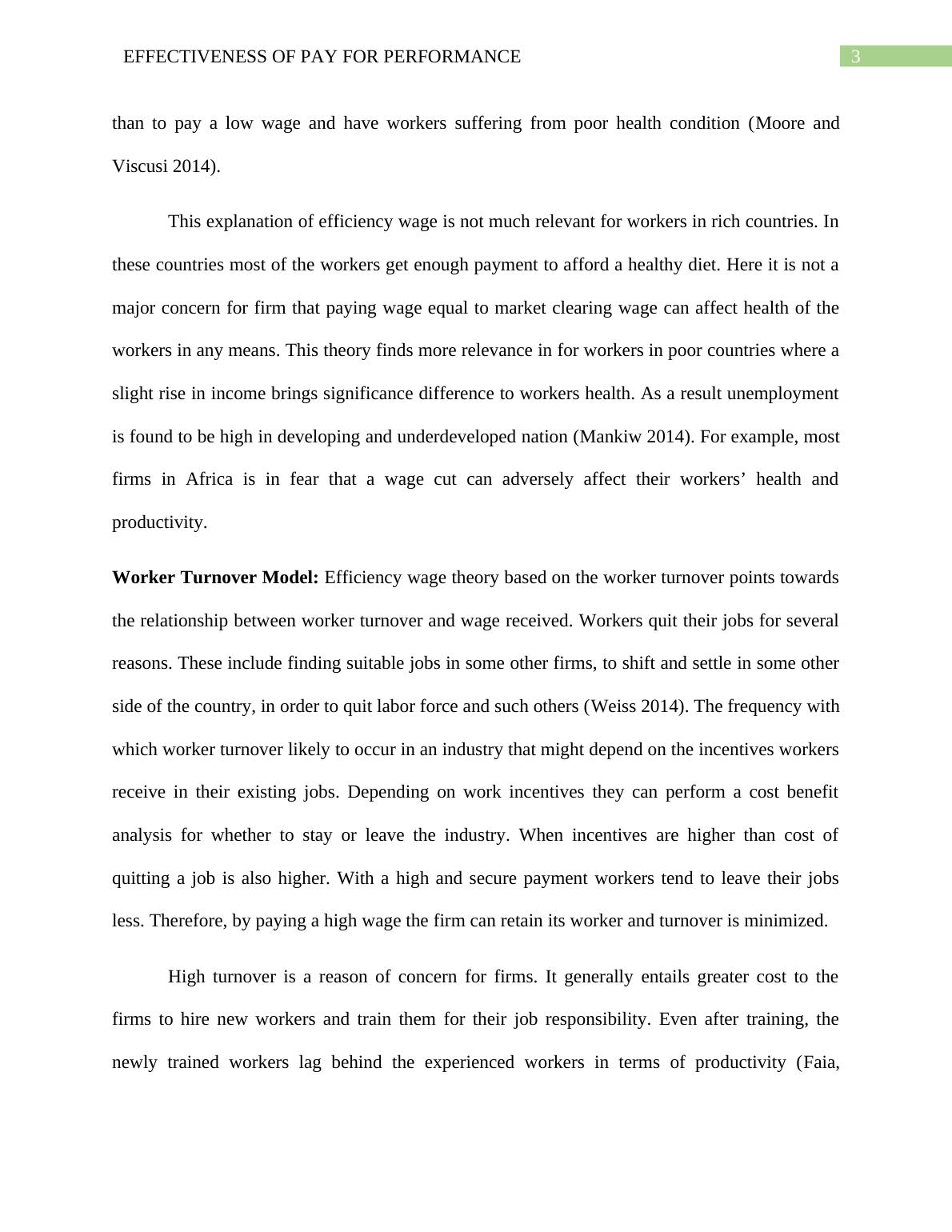Effectiveness of Pay for Performance
Added on 2020-05-08
17 Pages4862 Words146 Views
Running head: EFFECTITIVENESS OF PAY FOR PERFORMANCE Effectiveness of Pay for PerformanceName of the StudentName of the UniversityAuthor note

EFFECTIVENESS OF PAY FOR PERFORMANCE 1Introduction Wage is the remuneration given to the employees. Wage provides incentives to theworkers to work. The equilibrium wage in the labor market is determined from the forces oflabor supply and labor demand. When employers without any pressure from regulatory body setsa wage above the equilibrium wage then the wage is called efficiency wage (Weiss 2014). Theefficiency wage theory explains a positive relationship between wage and work effort orperformance of workers. The theory suggests firms should offer wage above the wage that clearsmarket. When a high wage is offered then workers become more responsible toward their jobswhich in turn increases their loyalty and reduces shirking behavior on the part of employees.Premium wages increases integrity in the work place. All these contribute to increasingproductivity and increases profit. A low level of wage or wages just equal to market clearinglevel increases dissatisfaction among the employees. This negative attitude hampers productivityand increases turnover rate among the employees (Dunlop and Segrave 2016). Anotherimportant theory that explains relationship between labor supply and wage is the theory ofbackward bending labor supply curve. According to this theory motivation for work effortincreases in line with wage only up to the certain point. After that critical threshold limit laborsupply falls even when wage increases. This is because workers give more preference to leisurethan work effort. The research essay analyzes theoretical framework of both the concept and then attemptsto evaluate it based on empirical evidences from existing economic literature.

EFFECTIVENESS OF PAY FOR PERFORMANCE 2Economic literature on theoretical framework The theory of efficiency wage There are several reasons for which labor market always experiences some unemployment. Thecommonly discussed factors for some persistent unemployment include minimum wagelegislation, people looking for new jobs and bargaining by labor union. Above all, another reasonfor having a situation of labor surplus is suggested by the theory of efficiency wage (DiGabrieleand Ojo 2017). This theory is in support of the fact that a more efficient operation is ensured bythe firm when it keep wages above the market equilibrium wage. The resulted profitabilityencourages firm to offer a high wage to the existing workers even when surplus labors arepresent in the economy. Minimum wage, labor union bargaining and efficiency wage all end upwith unemployment because of wages above the equilibrium level. However there is differencebetween efficiency wage and the former two model. In the first two cases regulatory bodies andunion restricts firm to lower the wage from set minimum level. With efficiency wage theory suchconstraints are not needed as firms are better off from paying a high wage. The rationale is thatprofitability of firms’ increases with high wage as it enhances efficiency (Razzak 2015). There are several theories of efficiency wage each explaining positive associationbetween wage and worker efficiency from a different aspect.Workers Health: It is the simplest form of efficiency wage theory. It describes a direct linkbetween wages offered and health of the workers. When workers receive high remuneration theycan afford a nutritious diet. The healthy diet make workers healthier and increases productivity.Employers may prefer to pay high wage and retain a healthier and productive pool of workforce

EFFECTIVENESS OF PAY FOR PERFORMANCE 3than to pay a low wage and have workers suffering from poor health condition (Moore andViscusi 2014). This explanation of efficiency wage is not much relevant for workers in rich countries. Inthese countries most of the workers get enough payment to afford a healthy diet. Here it is not amajor concern for firm that paying wage equal to market clearing wage can affect health of theworkers in any means. This theory finds more relevance in for workers in poor countries where aslight rise in income brings significance difference to workers health. As a result unemploymentis found to be high in developing and underdeveloped nation (Mankiw 2014). For example, mostfirms in Africa is in fear that a wage cut can adversely affect their workers’ health andproductivity. Worker Turnover Model: Efficiency wage theory based on the worker turnover points towardsthe relationship between worker turnover and wage received. Workers quit their jobs for severalreasons. These include finding suitable jobs in some other firms, to shift and settle in some otherside of the country, in order to quit labor force and such others (Weiss 2014). The frequency withwhich worker turnover likely to occur in an industry that might depend on the incentives workersreceive in their existing jobs. Depending on work incentives they can perform a cost benefitanalysis for whether to stay or leave the industry. When incentives are higher than cost ofquitting a job is also higher. With a high and secure payment workers tend to leave their jobsless. Therefore, by paying a high wage the firm can retain its worker and turnover is minimized. High turnover is a reason of concern for firms. It generally entails greater cost to thefirms to hire new workers and train them for their job responsibility. Even after training, thenewly trained workers lag behind the experienced workers in terms of productivity (Faia,

End of preview
Want to access all the pages? Upload your documents or become a member.
Related Documents
Human resource economics PDFlg...
|10
|2297
|159
Efficiency Wage Theory: A Critical Evaluationlg...
|8
|1541
|491
Report on Human Resource Economicslg...
|12
|2633
|250
Efficiency Wage Theory - PDFlg...
|9
|1599
|497
Minimum Wage and Unemployment in Microeconomicslg...
|6
|703
|325
Efficiency Wage Theory: How Higher Wages Affect Worker Productivitylg...
|15
|4199
|58
